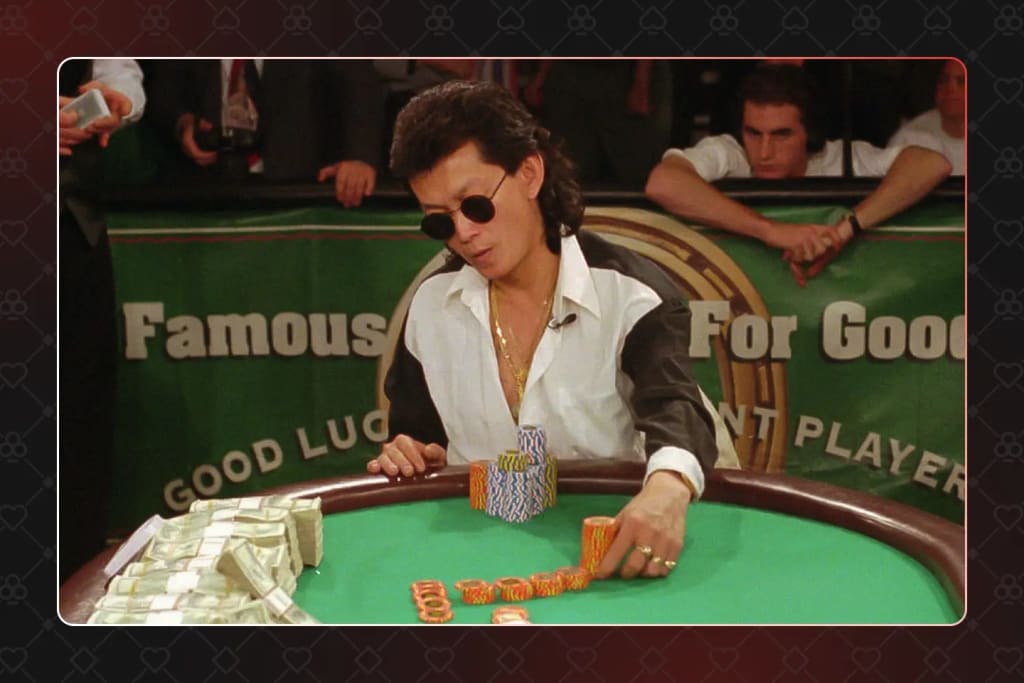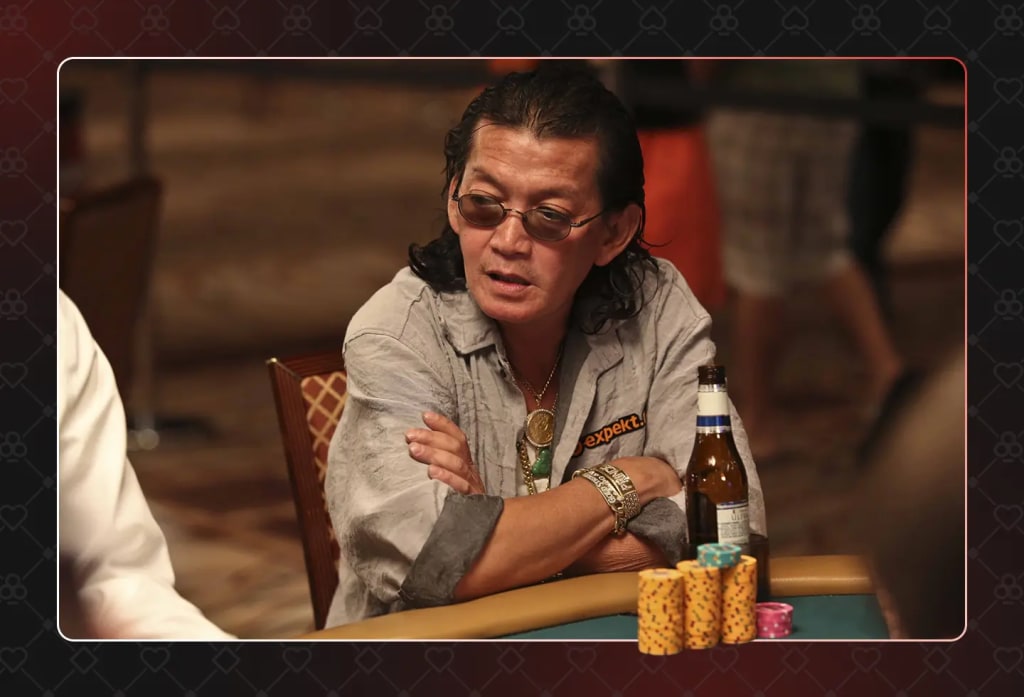The Prince of Poker: Scotty Nguyen’s WSOP Stats, Net Worth, and Iconic Poker Moments

There’s a moment in poker lore so iconic it almost doesn’t feel real anymore. Picture it: 1998, the final table of the World Series of Poker Main Event. Lights blaze, cameras zoom in. A man in white boots and oversized sunglasses leans back with a cognac in one hand and destiny in the other. He stares across the felt and delivers one of the greatest lines in the game’s history:
“You call, it’s gonna be all over, baby.”
The man across the table calls. Scotty Nguyen flips over a full house. Boom. That’s poker—another legendary moment for the history books.
But don’t mistake that one-liner for the whole story.
Scotty Nguyen’s life is more than a YouTube highlight or a poker meme. It is a journey that spans continents, cultures, and a storm of personal demons. It’s the rise of a kid who didn’t belong anywhere, the reign of a man who made poker shine, and the long, messy road to redemption.
This isn’t just a story about cards. It’s about identity, pain, swagger, survival, and what it really means to win.
From Thuan to Scotty: Escaping War and Finding Vegas
Before the lights, the fame, the money, and the phrases, there was Thuan Nguyen, a young boy growing up in South Vietnam as his country unraveled around him. Born in 1962, Scotty was just a kid when the Vietnam War began shaping every corner of his world. Bombs, scarcity, and fear were daily norms.
When Saigon fell in 1975, Nguyen’s life was upended entirely. As a refugee, he joined thousands in fleeing the chaos. He made it to Taiwan, then eventually to the United States. Alone, scared, and just 14 years old.
He didn’t speak the language. He didn’t know the culture. But he had something most people never get taught: grit.
He bounced between foster homes and schools, often labeled a troublemaker or lost cause. Eventually, he dropped out. Traditional education never quite clicked with him. But the casinos? The casinos made sense.
Scotty started as a busboy, then worked his way into dealing poker in Las Vegas during the early 1980s. Watching the cards fly, memorizing betting patterns, and reading reactions became second nature to him. Every shift was a silent masterclass.
By his early 20s, he wasn’t content to just watch the game. He was ready to play it. And not just for side cash: he was after glory. And he knew, in his gut, he had what it took.
The Road to the Crown Was Paved with Chaos
Success didn’t happen overnight. Nguyen’s early years as a player were volatile: brilliant highs followed by crushing lows.

He’d run up stacks, then lose it all. Sometimes it was the cards, sometimes it was the partying, and most often it was both. In one infamous run, he built a bankroll big enough to walk away for good, only to bust it in a matter of days. No backup plan. No safety net.
But Nguyen never folded, not in life, not at the table.
What makes his journey remarkable isn’t just the success. It’s the resilience. The ability to lose everything, money, friends, even self-worth, and still come back, chip in hand, smile on his face.
There’s a poker lesson in that: survival isn’t about never losing. It’s about knowing how to rebuild.
The Game That Spoke His Language
It’s hard to overstate what poker meant to someone like Scotty. For a Vietnamese refugee who’d struggled to belong, the poker table was neutral ground. No one cared if you had an accent or dropped out of school. The only question was: Can you play?
And Scotty Nguyen could play.
Poker became a kind of equalizer. It didn’t require fluent English, just fluent instinct. He could sit across from anyone, from any walk of life, and speak in chips and reads. And more than that, he could thrive.
Scotty Nguyen, the Star: The Prince of Poker Is Born
As ESPN brought poker to mainstream audiences in the early 2000s, Nguyen was tailor-made for TV. He wasn’t just another pro: he was a showman.
His poker résumé got loaded:
- 1997: Breakout performances, multiple cashes, eyes start turning.
- 1998: The legendary WSOP Main Event win. The one-liner. The full house. Poker immortality.
- 2001–2007: A run of consistency; bracelets, cashes, final tables.
- 2008: Captures the elusive $50K H.O.R.S.E. Championship, arguably the toughest title in poker.
All in all, his live tournament winnings exceed $12.7 million, and that is not counting private cash games, where he was said to clean up quietly and consistently.

But the real win? The cultural impact.
Every time Scotty played, he turned the poker table into a theater stage: he winked, he joked, he played hands blind, he roasted his opponents mid-hand. He turned high-stakes poker into theater, and fans couldn’t get enough of the show.
And still, behind all that flash was a razor-sharp mind. Nguyen wasn’t just winging it: he knew the math, he understood the flow, timing, and pressure of the game. He studied people meticulously. And his persona? That was just part of his weaponry.
Representation and Responsibility
For many fans, especially Vietnamese and Asian-American players, Scotty wasn’t just entertaining. He was empowering.
He looked like them. He sounded like family. He represented the possibility that you didn’t have to hide who you were to belong. You could win because of your authenticity, not despite it.
He made poker more human. You didn’t need to know reverse implied odds to love watching him. You just needed to enjoy people.
The Catchphrases Were the Bait
Everyone remembers the lines:
“You call, it gonna be all over, baby.”
“That’s poker, baby.”
“I love you, baby.”
They became part of poker’s pop culture, spoken at home games, echoed in chat rooms, and printed on shirts.
But here’s what people often miss: they were a strategy. Nguyen used humor and charm to throw opponents off their game. He disarmed them. Made them underestimate him. Made them forget he was, deep down, a predator.
And it worked.
He wasn’t just saying those lines. He was using them. And when you weren’t paying attention, he took your chips.
The Fall 2008 H.O.R.S.E. Final Table
Now for the tough part.
The 2008 H.O.R.S.E. final table should have been a coronation. Nguyen had played masterfully, navigating five poker variants under immense pressure. It was, by many accounts, one of the best-played tournaments of his career.
But that’s not what people remember.
They remember the slurred words. The frustration. The way he berated dealers and antagonized other players. The fact that he was visibly intoxicated and couldn’t control it.
It was uncomfortable to watch. A hero unraveling in real time.
And though he won the bracelet, he walked away with a battered reputation.

The poker world, so often quick to forgive antics, paused. Forums exploded. Articles were written. Fans who once cheered for him now questioned what had gone wrong.
Facing the Mirror
To his credit, Nguyen didn’t hide. Eventually, he apologized. He admitted the obvious—he was struggling. The drinking had become a problem. The pressure had built up. The persona had become too heavy to carry.
But that’s when the real comeback started: not at the table, but in life.
Nguyen began to rebuild. Not all at once. Not perfectly. But deliberately. He took accountability. He started to speak more openly about addiction. About mistakes. About pain.
And in that honesty, people found a new respect for him, not as a legend, but as a man.

Beyond the Table: Battles You Don’t See
Scotty Nguyen’s fight with addiction wasn’t just a chapter—it was a war. Years of numbing the pain with alcohol and drugs had taken their toll.
He’s talked about near rock-bottom moments—times he lost friends, nearly lost his family, and came terrifyingly close to losing himself.
These days, he’s different. Grounded. Calmer. Still playful, still quick with a line—but more present. More real.
When Scotty Nguyen says “baby” now, it lands differently. There’s wear behind it. Experience. Clarity.
His recovery became part of his legacy because poker tests more than your reads. It tests your will to grow.
The Hall of Fame and the Legacy That Won’t Fade
In 2013, the Poker Hall of Fame made it official: Scotty Nguyen was inducted alongside legends. But most fans would say he earned it long before that.
Nguyen is more than his earnings or even his bracelets. He’s a symbol.
For immigrants. For underdogs. For those who stumble and refuse to stay down.
He’s a mentor now. You’ll see him at events, surrounded by new players who just want a moment, a story, a tip. And he gives it, because he remembers being invisible once.
He’s also used his voice to champion dealer appreciation, something few players of his stature do. He knows what it’s like to stand behind the table, ignored.
A Different Kind of Influence
Scotty’s influence didn’t stop at the felt. He helped shape poker’s golden era, the televised age where characters mattered as much as cards.
He made poker cool again. Stylish. Fun. Human.
His impact is visible in players like Daniel Negreanu, who’ve built brands on personality and presence. In streamers and vloggers who understand that the story matters as much as the hand.
Even in fashion, Scotty’s bold style, flashy jewelry, and fearless expression of self opened doors in a game that once demanded conformity.
Scotty Nguyen in the Solver Era
Today’s poker landscape is ruled by GTO solvers, HUDs, and hoodie-clad online assassins. It’s clean. It’s efficient. It’s…quiet.
In that world, Scotty Nguyen is a living, breathing contradiction. And that’s exactly why he still matters.
He reminds us that poker is still a game for the people. Reading a soul is just as valuable as solving a spot; a well-timed smile can be as lethal as a three-bet.
Even when he’s not at the top of the leaderboard, people watch him because he’s interesting. Because he feels.
So What’s Next for the Prince?
These days, Scotty Nguyen plays less frequently. He picks his spots. Shows up when it matters. Sometimes he’s there to compete. Sometimes just to connect.
He’s also spending more time with his family, himself, and with the quieter parts of life he used to ignore.
He doesn’t need the spotlight anymore—but when it finds him, he still shines.
There’s always a seat at the table for Scotty. Preferably one with a glass of cognac nearby, a few cameras rolling, and maybe—just maybe—a quote waiting to become immortal.
Because Scotty Nguyen didn’t just play poker.
He changed what a poker player could be.
He reminded us that poker isn’t just about cards or chips—it’s about humans. It’s about drama, risk, and redemption. And sometimes, the most unforgettable hands aren’t the ones you win on the river, but the ones you play in the dark and live to tell.
That’s poker, baby.




















